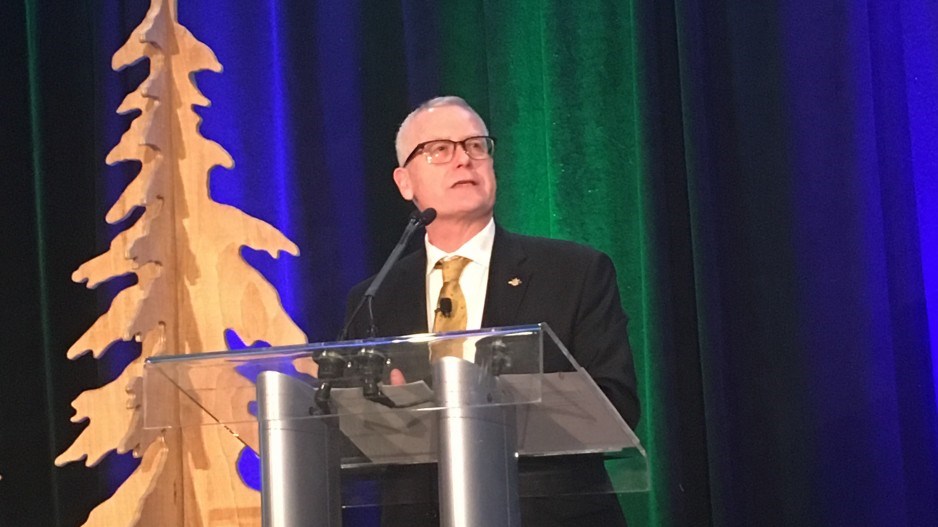B.C. interior politicians are outraged that Tim Renneberg, a ministerial aide to Minister of Forests, Lands, Natural Resource Operations and Rural Development Doug Donaldson, has called the Rural Dividend Fund “just a slush fund for MLAs to do cheque presentations.”
The fund began handing out funding in 2016 under the former Liberal government. Many interior communities relied on the three-year, $75 million funding program for local project development.
“It is an insult to all the many projects that the fund had provided over its term and belittled all and every project and rural community that received the funding,” Williams Lake Mayor Walt Cobb said of the comments made in an email by Renneberg.
In September, Donaldson announced a $69 million support package for workers displaced in the forestry sector downturn.
What Donaldson left out, Liberal Leader Andrew Wilkinson said at the time, was that the funding came partially from the suspension of the funds’ remaining $25 million.
“It’s not a slush fund,” said Regional District of Kootenay Boundary director Grace McGregor, who was part of the original process to create the fund. “I think communities would find that a very difficult message.”
“It was to give small rural communities a hand up,” she said.
Cobb said, “If a comment like that, regarding the slush fund, was made by a member of my staff in grants that we provide as a city to our many community projects, they would be looking for a new job.”
The government said the fund and applications for assistance were suspended, not cancelled.
McGregor, however, said the fund’s suspension hurts displaced workers and their communities.
Renneberg called it a “slush fund” in a January 2018 email to various ministries and Premier John Horgan’s office.
Renneberg Memo by Emma Crawford Hampel, BIV.com on Scribd
Renneberg was seeking to establish an ad hoc, inter-ministerial committee on rural development focused on strengthening traditional industries including forestry, mining, oil and gas, agriculture, tourism, manufacturing and technology.”
He said under the Liberals, such industries never fully recovered from the 2008 recession and that the previous government’s response had been to push for liquefied natural gas development and create the fund, he said.
Renneberg suggested getting rural development right could assist in strengthening interior populations.
“I think B.C. can be a leader in reversing the global trend of depopulation in rural B.C., but we have to engage as much of Team Government as we can to get it right.”
When challenged with Renneberg’s words in the legislature Wednesday, Donaldson said, “The previous government might have considered this rural dividend a slush fund, but we do not. We repurposed the rural dividend funding for this fiscal year. We've held on to the applications, and we repurposed it into support for Interior forest workers.
“The funds need to be reallocated on a temporary basis in order to support forestry workers that were ignored by the previous government,” Donaldson said.
The Canadian Oxford Dictionary defines a slush fund as, “reserve funding esp. as used for political bribery.”
Premier John Horgan's communications chief Sage Aaron said the NDP is making substantial interior investments, citing hospitals in Williams Lake and Fort St. James and childcare spaces in Kamloops.
“It’s typical of the BC Liberals to take emails they received through (freedom of information) completely out of context,” Aaron said. “The email was actually describing their approach to rural B.C. and to the Rural Dividend Program when in government.”
"Forestry workers in the Interior told us they wanted supports to stay in their communities, so we focused $69 million where it was most urgently needed.
Our government understands the importance of the Rural Dividend Program to communities and have retained all the applications,” Aaron said.
She said ministry staff is working to with suspended fund applicants to redirect the applications where appropriate.
The Union of B.C. Municipalities in September passed a Regional District of Kootenay Boundary resolution calling on the NDP government to reconsider the re-allocation of money away from the dividend program “while identifying alternative funds to simultaneously deliver supports for communities impacted by mill closures and curtailments.”
Fund criteria were conceived with input from the 13-member Rural Advisory Council, formed in March 2015.
Cobb said senior levels of government have a responsibility to provide funding to taxpayers who actually provide the funds they are re-distributing.
“The comment may reflect his ministers and possibly this government’s feelings on how to assist rural B.C., but we greatly appreciated any funding we received, as I am sure other communities and economic development groups were provided,” Cobb said.
@jhainswo




